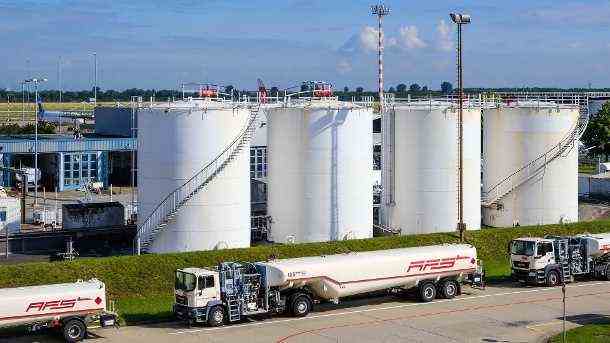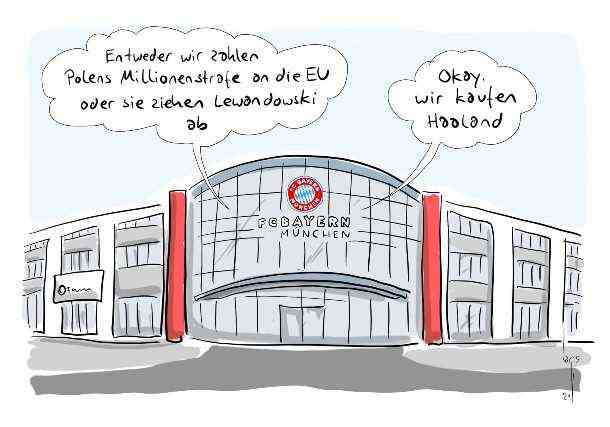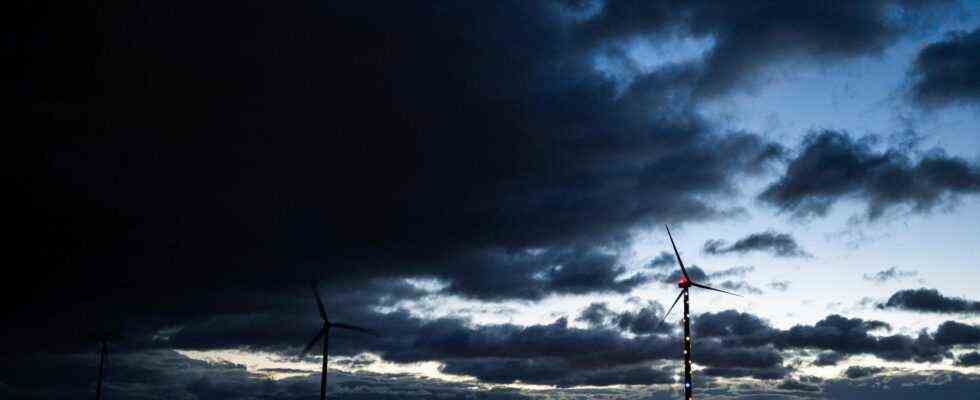Good morning, dear reader,
we know that from ourselves: We like to postpone uncomfortable duties into the future. The tax return has to be made? Ah, right, I’ll do it next weekend. Does the cellar urgently need an organizing hand? Yes, it will be your turn in the next vacation. The fence is rotting in the garden, the neighbors are already looking disgruntled? Yes, yes, I know, I’ll take care of it soon! We write a long note in the calendar, underline it twice, put an exclamation mark after it – and happily turn to more pleasant things. After all, we now have a plan. And when the next weekend or the next day of vacation comes, we see the note, think about how annoying such a tax return, how exhausting a whole afternoon in the stuffy basement and how tiring gardening is – and postpone the good resolutions again. Fortunately, that is not a catastrophe in everyday life, we are all just human beings, and at some point things will jerk around.
We all behave in exactly the same way with one another, also with another topic – but unfortunately the problems do not simply dissolve in the process. Our collective procrastination there has catastrophic consequences. The amount of Greenhouse gases The earth’s atmosphere grows and grows, Corona or not, and all half-hearted efforts to protect the climate are just the famous drop in the ocean. Power plants, factories, cars, trucks, planes, ships and factory farming are heating up the planet like there is no tomorrow. The hesitant progress in the restructuring of the energy supply in Europe and North America is insufficient in front and behind and is counteracted by opposing developments elsewhere: China, India, South Africa, Russia, Brazil and other countries continue to rely fully on fossil fuels despite full-bodied Sunday speeches. They are building new coal-fired power plants, selling coal, oil and gas, cutting down virgin forests and growing gigantic soy fields.
The United Nations has just reassessed all previous efforts in global climate protection and has come to a sobering conclusion: The global average temperature will be by the end of the century 2.7 degrees Celsius warmer. That may sound like little, but the consequences are dramatic. Whole regions of the world, especially in Africa and Asia, are likely to become uninhabitable. Scientists expect millions of climate refugees global economic output is likely to decline by a tenth. In comparison, the corona shock will be a piece of cake. “Human influence is warming the climate at a rate that has been unprecedented in at least 2,000 years,” write the authors of the last world climate report. Except that at that time there weren’t nearly eight billion two-legged friends on earth.
We run into a situation we can neither see nor control: That is the translation of the scientific prognoses in one sentence. And that is the starting position if the 26th World Climate Conference begins in Glasgow, Scotland, about which our reporter Theresa Crysmann will report. The summit is intended to be the forum at which the countries of the world coordinate their efforts to protect the climate. In truth, it may be the last lifeline we can throw. “We are on the way to catastrophic global warming,” says UN Secretary General António Guterres, and his colleague Inger Andersen adds what this is all about: “The world needs this Sevenfold of the recently expressed ambitions to achieve the 1.5 degree target. “
Seven times as much. Just let that sink in. Then you may begin to suspect: It is not enough for you and I to leave our car parked once a week, for our next vacation to take the train instead of flying, or for us to have a steak less often Place plates. The sevenfold of the previous climate protection efforts means above all that all people on this beautiful, fragile planet one develop different awareness of the priorities of their life.
To do this, you can ask yourself a few simple questions: What is really important to us? Do we want to live in a reasonably intact nature? What do we intend to leave behind to our children and grandchildren – a lovable home or a bunch of pigs? Do we really need Vietnamese sneakers, Argentina beef and Australian red wine? Do we think it’s a good thing that key components of our cars, smartphones and wardrobes come from China? Are we ready to take in several million Africans and Arabs in Europe, whose homes are becoming uninhabitable? Are we prepared for the distribution struggles that are likely to break out over drinking water and food? And above all: Are we really interested in the unpleasant questions that climate protection brings with it? Do we talk about it with relatives, friends, colleagues? Let’s reinforce that public awareness, that something has to change as quickly as possible, that we all have to act more resolutely and consistently together?
The answer is actually not that difficult, almost like in everyday life: The tax return must now made the basement now tidied up and the rotten garden fence now be repaired immediately. When it comes to climate protection, it is best to start with yourself and your environment: think along, rethink, ask questions. “Everyone wants to change the world, but nobody wants to change himself”, noted the Russian writer Leo Tolstoy. Let’s start refuting it!
______________________________
Cash tap closed!
In view of the pressing climate protection goals One can be amazed that this phenomenon still exists: the so-called environmentally harmful subsidies. State support for practices and products that should actually be punished because they harm nature and the climate. Examples of this are the area premiums in EU agricultural subsidies, the diesel privilege, the energy tax exemption for kerosene, commuter lump sums without ecological steering effect and the lower taxation of animal foods such as eggs, milk and meat. Most recently in this country every year 67 billion euros flowed into environmentally harmful activities, reports the nature conservation association.
Today the Federal Environment Agency presents its latest study “Environmentally harmful subsidies in Germany”. The potential traffic light coalition should take a close look at the figures. It is already clear that politics must always design, cushion and balance transitions. But if you identify the right potential for deletion here, you kill several birds with one stone: You save the state spending, reduce the costs that will arise in the future due to environmental and health consequences – and remove an obstacle to climate-friendly products and processes on the market.
 Tanks for aviation fuel at Düsseldorf Airport. (Source: imago images)
Tanks for aviation fuel at Düsseldorf Airport. (Source: imago images)
______________________________
Again and again Poland
Only last week he gave an incendiary speech in front of the European Parliament in Strasbourg, then Poland’s national-conservative prime minister swaggered Mateusz Morawiecki in an interview with the British newspaper “Financial Times” of a “Third World War” and accused the EU Commission of she is making demands of his country “with a gun to our head”. Yesterday showed up European Court in Luxembourg unimpressed by all the chatter and sentenced Poland to pay one daily fine of one million euros, because the country refuses to implement judgments on controversial judicial reforms.
And what is happening in Poland meanwhile? Today the parliament in Warsaw is considering a bill to ban demonstrations for equality for non-heterosexual people. Public gatherings should not aim at “questioning marriage as a relationship between women and men” or “promoting the expansion of marriage to include persons of the same sex”. Our neighboring country is about to say goodbye to the European community of values.
____________________________
Hello Joe!
US President Joe Biden is setting out on a multi-day trip to Europe today: Tomorrow the Catholic will have an audience Pope Francis, on Saturday the two-day begins in Rome G20 summit, which our reporter Patrick Diekmann will report on. And from Monday Biden wants to take part in the world climate summit in Glasgow. It is only the second trip abroad since he took office in January – the first one had already taken him to Europe.
______________________________
Read what
 Bayern star Robert Lewandowski is shocked on his face. (Source: Marius Becker / dpa)
Bayern star Robert Lewandowski is shocked on his face. (Source: Marius Becker / dpa)
“Isn’t Munich’s dominance slowly getting boring?” I asked you this question about FC Bayern yesterday morning at dawn. Last night Bayern went down 5-0 in Mönchengladbach, after the second round it was over for the top favorites. My colleague Andreas Becker will tell you how that happened.
______________________________
Not a single intensive care bed is still free in the clinic in Mühldorf am Inn, the corona incidence is scratching the 600 mark: In the Bavarian district it is evident that the pandemic in Germany is far from over, reports our reporter Liesa Wölm.
______________________________
It is not often that a Nobel Prize winner interferes in daily German politics. But now the world-famous economists Joseph Stiglitz and Adam Tooze have warned against making FDP leader Christian Lindner finance minister.
______________________________
For weeks more and more refugees have been coming to Germany via Poland. Brandenburg Minister of the Interior Michael Stübgen has explained to the colleagues of the “FAZ”, why he sees the Kremlin behind the organized wave of migration.
______________________________
What amuses me
Creativity has never hurt.
 (Source: Mario Lars)
(Source: Mario Lars)
Have a nice day. Tomorrow Sven Böll will write the break of day, on Monday Johannes Bebermeier. You will read from me again on Tuesday.
Best regards,
you

Florian Harms
Editor-in-chief of t-online
E-mail: [email protected]
With material from dpa.
You can use the daily dawn newsletter Subscribe here for free.
All daybreak issues You will find here.
all messages read here.

